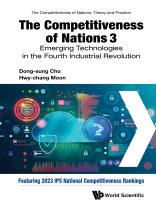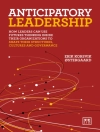In the existing reports on national competitiveness and rankings such as IMD World Competitiveness Yearbook and WEF Global Competitiveness Report, there are sizable discrepancies in the ranking order for the same countries. As a result, the reader is often confused because such an outcome creates difficulties for government officials when translating these findings into real-world policies.
These discrepancies are actually due to the differences in logic and analytical models used by IMD and WEF. Therefore, in recognizing the problems and limitations of these models, this book presents the IPS model as a new approach. As an extension of Michael Porter’s diamond model, it demonstrates a robust set of methodologies as well as offers a number of key policy implications for countries around the world that wish to enhance their national competitiveness.
The analytical tools used in this book can be further utilized for other units of analysis such as industries and firms. As this book provides a series of sophisticated methodologies and specific guidelines for enhancing national competitiveness, both academics and practitioners can derive useful implications from this research.
Alongside the theoretical frameworks and methodologies for national competitiveness presented in this book, the special theme and focus of this third volume is the fourth industrial revolution and the emerging technologies that are relevant to corporate and national competitiveness.
The discussion on the digitalization of business began as early as the 1990s, but emerging technologies such as big data, artificial intelligence, and cloud computing have only been a recent trend. Furthermore, the COVID-19 pandemic has accelerated the adoption of emerging technologies by both firms and countries. Yet, despite the growing importance of emerging technologies, firms and governments seem to be lagging in effectively integrating them into their operations. To address these challenges, this book explains how emerging technologies have affected firms, industries, and countries. It also welcomes discussion on how firms and countries are responding to the changing environment to enhance their competitiveness through these new technologies.
Contents:
- About the Authors
- About the Contributors
- Acknowledgments
- Introduction
- IPS National Competitiveness Research (NCR) 2023:
- Literature on National Competitiveness and a Case Study of Chat GPT
- Conceptual Framework and Analytical Methodologies
- Highlights
- Application of MASI: The Cases of the US and China
- Snapshot of Top 30 Economies
- Special Topic: Introduction:
- ABCD Technologies in the Fourth Industrial Revolution (Dong-sung Cho, Hwy-chang Moon, Wenyan Yin, Minji Hong, and Dilong Huang)
- Cases: Introduction:
- AI and Destructive Creation: Toward a New AI Urban Regime? (Gerardo del Cerro Santamaría)
- Corporate Strategy and Government Policy for Technological Development in Poland’s Peripheral Regions (Arkadiusz Mironko and Mariusz Sagan)
- Indigenous Knowledge Management in the Fourth Industrial Revolution: A Reflection on the Emerging Technologies and Development Strategies in Tanzania (John Jackson Iwata)
- Developing Human Capital for Competitiveness: A Study of Singapore’s Artificial Intelligence Apprenticeship Program (AIAP) from a Systems Thinking Viewpoint (Ashish Kumar, Kirankumar S Momaya, Laurence Liew, and Sean Shao Wei Lam)
- Factors Influencing the Future of Work 4.0: Technological Competitiveness, Education, and Policy Coordination (Maria M Feliciano-Cestero)
- Analyzing the Digital Entrepreneurial Ecosystem: Evidence from the Information Technology-Related Small and Medium Enterprises in an Emerging Economy (Md Noor Un Nabi, S M Misbauddin, Farzana Akter, Mohammad Awal Hossen, and Fatema Tuj Zohora)
- The Role of MNEs in Industry 4.0 Transformation in ASEAN (Maria Cecilia Salta-Macesar)
- Appendix: Factor and Sub-factor Rankings
- Index
Readership: Advanced undergraduate and graduate students, researchers and practitioners in the fields of national competitiveness and international business.
Key Features:
- Method: The evaluation model is based on a solid theoretical framework, hence the factors and criteria for evaluation are more comprehensive and systematic. The framework is very easy to apply, thereby attractive for not only researchers but also practitioners
- Data collection: For evaluating the national competitiveness, in addition to collect the statistical and survey data, this book also collects text data by using the method of text-information analysis. Thereby, the book reflects the most recent competitiveness development of nations, which can be an appropriate reference for practitioners of analyzing the recent trend
- MASI framework: This book not only measures the competitiveness of nations but also provides strategic guidelines for enhancing their competitiveness. Therefore, it will be a very useful handbook for policy makers of governments. In addition to the conceptual frameworks, the real-world case from developed and developing countries will be attractive to diverse readers around the world.












